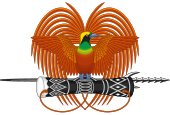1951 Papua New Guinean general election
 |
|---|
|
|
General elections were held in Papua and New Guinea for the first time on 10 November 1951.[1]
Electoral system[edit]
The Legislative Council was formed following the amalgamation of the Territory of Papua and the Territory of New Guinea after World War II. The bill passed by the Australian parliament provided for a 29-member Council consisting of the Administrator, 16 civil servants, nine members appointed by the Administrator (three representatives of the indigenous population, three representing European settlers and three representing missionaries) and three elected Europeans.[2] The Administrator served as presiding officer of the legislature.[3]
Voting was restricted to residents aged 21 or over who had lived in the territory for the last 12 months prior to registering to vote and were not classed as a native or alien.[3] The Chinese community were also given the right to vote alongside Europeans.[4] Candidates had to have lived continuously in the territory for the three years prior to submitting their nomination paper and not be a public employee.[3]
The three elected members were elected from three single-member constituencies, New Guinea Islands, New Guinea Mainland and Papua by preferential voting.[1]
Results[edit]
| Constituency | Candidate | Votes | % | Notes |
|---|---|---|---|---|
| New Guinea Islands | Don Barrett | 150 | 52.6 | Elected |
| P.A. MacKenzie | 95 | 33.3 | ||
| G. Renton | 40 | 14.0 | ||
| New Guinea Mainland | Carl Jacobsen | 158 | 50.1 | Elected |
| S.B. Barker | 67 | 21.5 | ||
| N.H. White | 66 | 21.2 | ||
| E.C.N. Helton | 20 | 6.4 | ||
| Papua | Ernest James | 268 | Elected after preferences | |
| J.I. Cromie | 223 | |||
| J.R. Bleck | ||||
| T.F. Rosser | ||||
| M. Infante | ||||
| N.F. Maloney | ||||
| Invalid/blank votes | – | |||
| Total | 1,295 | 100 | ||
| Registered voters/turnout | 1,697 | 76.3 | ||
| Source: Pacific Islands Monthly | ||||
Appointed members[edit]
| Position | Member | |
|---|---|---|
| Administrator | Jack Keith Murray | |
| Civil servants | Chief Collector of Customs | Thomas Philip Myles Byrne |
| Acting Government Secretary | Claude Champion | |
| Assistant Director of District Services and Native Affairs | Ivan Champion | |
| Assistant Administrator | Donald Cleland | |
| District Commissioner for Northern | Sydney Elliott-Smith | |
| Acting Assistant Director of District Services and Native Affairs | John Rollo Foldi | |
| Director of Education | William Groves | |
| Director of Public Health | John Gunther | |
| Secretary of Lands, Surveys and Mines | Eric Patrick Holmes | |
| Director of District Services and Native Affairs | Bert Jones | |
| Director of Forests | James Bannister McAdam | |
| District Commissioner for New Britain | John Keith McCarthy | |
| Acting Director of Agriculture, Stock and Fisheries | Colin Charles Marr | |
| District Commissioner for Morobe | Horrie Niall | |
| Treasurer and Director of Finance | Harold Reeve | |
| Crown Law Officer | Walter William Watkins | |
| Representatives of Europeans | Doris Booth | |
| Basil Fairfax-Ross | ||
| John Bexley Sedgers | ||
| Representatives of Natives | Merari Dickson | |
| Aisoli Salin | ||
| Pita Simogun | ||
| Representatives of Missionaries | James Dwyer | |
| Frank George Lewis | ||
| David Eric Ure | ||
| Source: Pacific Islands Monthly | ||
Aftermath[edit]
The new Legislative Council met for the first time in Port Moresby on 26 November.[5]
In February 1952 Steven Lonergan (Government Secretary) and R.E.P. Dwyer (Director of Agriculture) replaced Claude Champion and Colin Marr, who had been acting in their positions at the time the council was appointed.[6] Thomas Byrne died in February 1952 and was temporarily replaced by Acting Chief Collector of Customs Thomas Grahamslaw until Frank Lee was appointed as Byrne's permanent replacement later in the year.[6][7]
Bert Jones was replaced by the new Director of Native Affairs Alan Roberts in November 1953.[8] C.D. Bates (District Commissioner for Morobe) and Douglas Macinnis (Secretary of Lands, Surveys and Mines) also joined the Council during its term.[3]
References[edit]
- ^ a b P-NG Legislative Council: Election of Three Members Pacific Islands Monthly, November 1951, p11
- ^ Local voice in Papua-N. Guinea administration: Legislative Council Taking Shape After Long Delay Pacific Islands Monthly, October 1951, p9
- ^ a b c d Legislative Council 1951, Institute of Commonwealth Studies
- ^ Future of Chinese Communities In The Pacific Pacific Islands Monthly, September 1953, p40
- ^ Legislative Council opened Pacific Islands Monthly, December 1951, p17
- ^ a b P-NG Legislative Council Pacific Islands Monthly, March 1952, p56
- ^ Australian Public Servants for P-NG Key Positions Pacific Islands Monthly, January 1953 p15
- ^ Promotion for Mr. A.A. Roberts Pacific Islands Monthly, December 1953, p42
